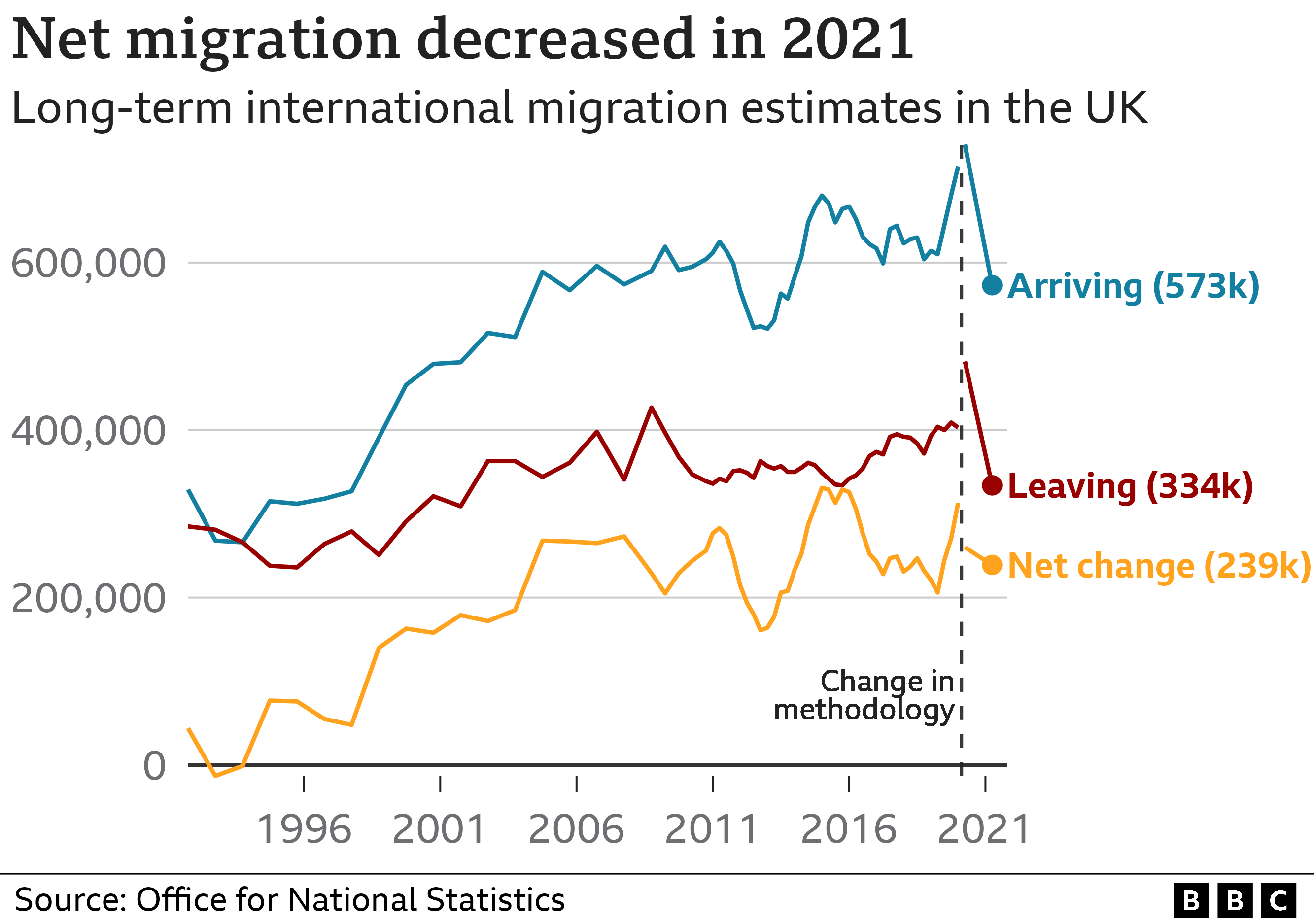
Solve worker shortages with immigration - CBI boss
The boss of the UK's largest business group urges politicians to be "practical" about immigration.
www.bbc.com
Recent official figures show the UK's unemployment rate has edged up, and the Bank of England has forecast it will nearly double by 2025 as the country goes through a tough recession.
Meanwhile job vacancies remain near record levels.
The Office for National Statistics (ONS) has also said UK business investment has dropped in recent months and remains below pre-pandemic levels.
Mr Danker said in his speech that the UK should enable "economic migration" in areas where skilled workers cannot be found.
He urged leaders to "be honest with people" over the country's "vast" labour shortages, adding "we don't have the people we need nor do we have the productivity".
"First, we have lost hundreds of thousands of people to economic inactivity post Covid," he said. "And anyone who thinks they'll all be back any day now - with the NHS under the pressure it is - is kidding themselves.
"Secondly, we don't have enough Brits to go round for the vacancies that exist, and there's a skills mismatch in any case. And third, believing automation can step in to do the job in most cases is unrealistic."
'First port of call'
Mr Danker is calling for more fixed-term visas for overseas workers in shortage occupations.In a speech to the CBI conference, Rishi Sunak said he wanted to attract "the best and brightest from around the world" to work in the UK.
He said the UK would create "one of the world's most attractive visa regimes for entrepreneurs and highly-skilled people", as he outlined plans to attract experts in artificial intelligence to the country,
But he said the UK's "number one priority right now, when it comes to migration, is tackling illegal immigration", adding that he is determined to do that.
"If we're going to have a system that allows businesses to access the best and brightest from around the world, we need to do more to give the British people trust and confidence that the system works and is fair," Mr Sunak said.
Earlier, Immigration Minister Robert Jenrick told TalkTV that if bosses needed "lower-skilled" staff, the domestic workforce should be their "first port of call".
"We want to bring down net migration. It's something that is... very important to the British people and we're on the side of the British people," he said.
Tony Danker told the BBC on Sunday the Autumn Statement offered no plan to revive economic growth
On Friday, the chancellor said immigration would be important for the UK economy in the years ahead, but the government still wanted to bring numbers down.
He said he wanted to improve skills "at home" to lower dependence on foreign workers.
Mr Danker praised some of the government's Autumn Statement, which saw Chancellor Jeremy Hunt set out £55bn of spending cuts and tax rises in a bid to curb rising prices while also protecting public services.
But he warned the UK must go further in order to solve years of stagnating growth and urged the government to make "tough choices" to help.
The UK's economy is performing worse than other major nations and is smaller than it was before the Covid pandemic.
The government has said the country is already in recession, which is defined as when an economy shrinks for two three-month periods in a row. It's a sign an economy is performing badly, with companies often making less money and unemployment rising.
Global factors are partly to blame, with energy and food prices soaring this year due to the war in Ukraine and Covid.
But the UK also faces significant labour supply challenges due to it being more difficult for small businesses to trade with Europe or recruit workers due to Brexit, which ended freedom of movement for EU citizens coming to the UK and vice versa.

According to figures from the ONS, net migration to the UK was estimated to be about 239,000 in the year ending June 2021, a slight fall from the previous year's figure of 260,000. The figure was driven by immigration from non-EU countries.
Last month a survey by the CBI, which represents 190,000 UK businesses, said almost three-quarters of UK companies had suffered from labour shortages in the past year and nearly half surveyed wanted the government to grant temporary visas for roles that were in "obvious shortage".
The boss of retailer Next has urged the government to let more foreign workers into the UK to ease labour shortages.
Lord Wolfson, who was a prominent advocate of Brexit, said the UK's current immigration policy was crippling economic growth.
The government has introduced a skilled worker visa scheme for some occupations facing shortages. It also has a seasonal workers scheme to cover jobs such as fruit pickers, and a health and care visa for medical staff.
Mr Danker said people might be "arguing against immigration but it's the only thing that's increased the potential growth of our economy since March".
"Growth is a precondition to a stable society. Without growth the NHS gets worse, not better. People's lives get worse, not better. And we lack the resources we need to transform ourselves to a zero-carbon world," he said.
"Yet Britain's had 15 years of low growth and flatlining productivity. We can't afford a repeat."
Mr Danker also called for trading regulations to be reformed, saying politicians could no longer blame EU rules.
"The biggest regulatory barriers facing businesses today are based on British laws, created by a British Parliament, and administered by British regulators," he said.